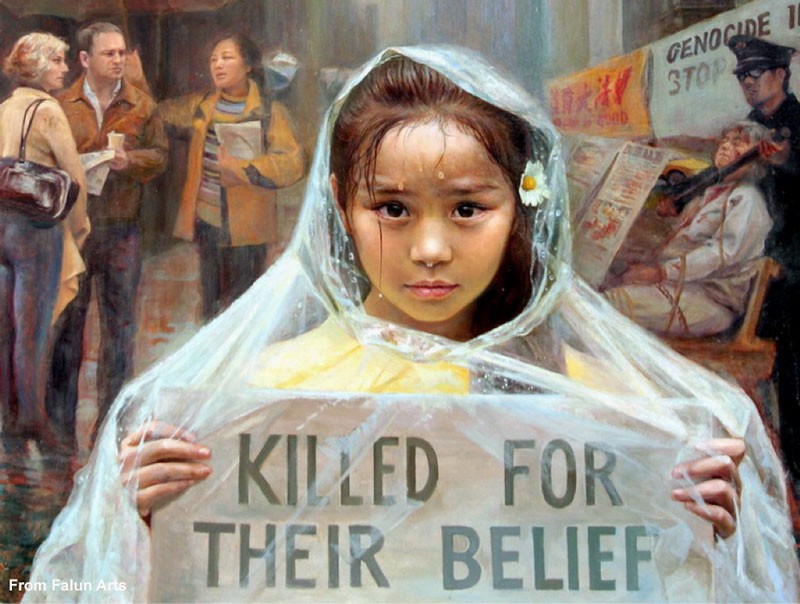Blog Post
Communist China is harvesting organs from religious prisoners, running concentration camps–while making deals with the West
By Jonathon Van Maren
Just as the Evil Empire was beginning to crumble and the Cold War was finally coming to an end with a victory for the West, the world was stunned when Communist China massacred students and other unarmed protestors in a brutal crackdown in Tiananmen Square. Many had hoped that Red China might slowly move away from totalitarianism and embrace Western ideals, and those hopes died with the dissidents who were gunned down in public and in full view of the global community.
Despite the fact that Red China had wracked up a kill count of somewhere around 65 million, had forcibly aborted millions of predominantly female children with their One Child Policy, imprisoned Christians and other religious minorities, and ran full-scale concentration camps for those the regime wished to oppress, the West decided to welcome China into the global community in the hopes that China could be moved toward democratic reform by prosperity.
That, it goes without saying, has not happened. Instead, China represents a terrifying new form of totalitarianism: One that is creating wealth without freedom. As quality of life rises for many Chinese people, the Communist government is experimenting with unprecedented forms of surveillance that make dystopian films look behind the times, with everything from “facial recognition towers” (some of which are getting pulled down during the Hong Kong protests) to a “ranking system” that can essentially reduce you to a non-person if you manage to get enough demerit points from the regime.
It’s easy to forget how evil the Chinese regime is as our analysts and talking heads obsess over trade and tariffs and cheap junk they’re sending us from the underpaid labourers in their factories. On my LifeSiteNews podcast recently, pro-life activist Jason Jones told the brutal story of how Chinese authorities once rounded up dozens of pregnant Uighur women, tied them down, and subjected them to forced abortions. Similar stories were recounted in the recent documentary One Child Nation, which took a close, hard look at China’s One Child Policy. And then there’s stories like this October 5 report by Amie Ferris-Rotman in the Washington Post:
The women have found refuge from Chinese authorities across the border in Kazakhstan, their ancestral homeland. But they remain haunted by the stories of abuse they carry with them. Some said that they were forced to undergo abortions in China’s Muslim-majority province of Xinjiang, others that they had contraceptive devices implanted against their will while in detention. One reported being raped. Many said they were subjected to sexual humiliation, incidents that included being filmed in the shower and having their intimate parts rubbed with chile paste.
The allegations come as China expands a years-long crackdown on its Muslim minority, which includes not only Uighurs but also Kazakhs and other ethnic groups. While the experiences described could not be independently verified, local rights groups and lawyers say they are common — and reveal a wider pattern of abuse directed specifically against women, aimed at curbing their ability to reproduce.
In December 2017, Gulzira Mogdyn, a 38-year-old ethnic Kazakh and Chinese citizen, was detained in Xinjiang after a visit to Kazakhstan because WhatsApp was found on her phone. She was placed under house arrest and examined by doctors at a nearby clinic, who discovered she was 10 weeks pregnant. “Two humans were lost in this tragedy — my baby and me,” Mogdyn said during an interview on the outskirts of Almaty, Kazakhstan’s largest city…A Kazakh woman with close relatives remaining in China was forced to undergo two abortions, in 2016 and 2017, while living in Xinjiang, her lawyer said. Aiman Umarova, a Kazakh human rights advocate and State Department honoree, said her client is seeking refuge in a Kazakh city and does not wish to be identified for fear of retribution. Umarova sees the women’s stories as forming a pattern.
“Sexually violating women, including stopping them from reproducing, has become a weapon for China against its Muslim population,” she said. The U.S. government and human rights groups estimate that between 1 million and 3 million Muslims have been detained in Chinese “reeducation camps” since 2017, most of them Uighurs. The Washington Post spoke with two men, including an Australian citizen named Almas Nizamidin, who suspect that their wives, both Uighurs still in detention in Xinjiang, were forced to terminate their pregnancies at a camp in 2017.
Under China’s one-child policy, abortions and contraceptives were encouraged — and often enforced — by officials tasked with keeping the population down. Exceptions were granted for ethnic minorities, who were allowed one more child than Han Chinese. The policy was abandoned three years ago, but that has not prevented the recent move to curb ethnic populations, said Leta Hong Fincher, a scholar and expert on gender equality in China. “There is a clear tightening of control over the reproductive rights of ethnic minorities,” she said.
In addition to mistreating detained women, rights groups and experts say, Beijing has pursued a campaign to erase Muslim culture in Xinjiang, by pushing interethnic marriages and sending Chinese officials for “home stays” with Muslim families, part of efforts by President Xi Jinping’s government to assimilate ethnic minorities. All of this amounts to genocide as laid out by the U.N. Convention on the Prevention and Punishment of the Crime of Genocide, said Rushan Abbas, founder and executive director of the Washington-based Campaign for Uyghurs…Some allegations extend further back. After the Urumqi riots in 2009, which analysts say triggered the harsh security measures now in place across Xinjiang, Islamic studies student Ruqiye Perhat was held in various prisons for four years.
There, the Uighur woman says, she was repeatedly raped by Han Chinese guards, resulting in two pregnancies. “Any woman or man under age 35 was raped and sexually abused,” she said through an interpreter from Turkey, where she now lives. Both pregnancies were forcibly aborted while she was in prison, said Perhat, who is now 30. Several female former detainees said they suspect that when younger and unmarried women were taken from their packed cells at night — to be returned the next morning or not at all — they were raped by guards.
“They’d come in and put bags on the heads of the ones they wanted,” said Gulzira Auelkhan, a 40-year-old woman in the Kazakh village of Akshi who spent 18 months in the camps. In May, an open letter written by a former guard at a Xinjiang camp appeared to support the women’s claims. His account, which was posted by activists, has not been independently verified. The ethnic Kazakh man, called Berik, said Chinese officers would watch women in their cells through a monitor before selecting one to take out. “There are two tables in the kitchen, one for snacks and liquor, and the other for ‘doing things,’ ” he wrote.
Other women contacted by The Post described widespread sexual harassment at the camps, echoing public comments last month by Sayragul Sauytbay, an ethnic Kazakh woman wanted by China for disclosing information about the camps. Kazakhstan allowed her to resettle in Sweden in June. Several said they were forced to shower and use the toilet in groups, in rooms outfitted with cameras. Auelkhan said female guards used chewing gum to pull on her pubic hair. Married women offered conjugal visits were ordered to swallow unknown pills afterward.
Ground chile peppers mixed with water in small glass jars were given to several women before showering. Once naked, they were ordered by female guards to smear the liquid on their genitals. “It burned like fire,” one woman recalled.
Asked to respond to the allegations, China’s Foreign Affairs Ministry referred The Post to a government paper released in August on plans to combat terrorism through education and training, including a section on “protecting trainees’ basic rights.” “You wouldn’t raise such questions if you had carefully read the white paper,” the ministry said in a faxed response. In July, when the United States was in the middle of a trade war with China, Secretary of State Mike Pompeo called Beijing’s treatment of Uighurs “the stain of the century.” But elsewhere, the response has been tepid. Even Muslim-majority countries have stood by China.
And this report in the Post isn’t even the most appalling information about the Chinese regime this month. That distinction would go to the Independent’s revelation that the Chinese government is cutting the organs out of prisoners while they are still alive in order to sell them for profit:
The Chinese government is harvesting and selling organs from persecuted religious and ethnic minorities on an industrial scale, the UN Human Rights Council has been told. Speaking at the council’s headquarters in Geneva on Tuesday, lawyer Hamid Sabi presented the findings of the China Tribunal, an independent tribunal on allegations of forced organ harvesting.
Mr Sabi told the council that UN member states have a “legal obligation” to act after the tribunal’s final report in June found that “the commission of crimes against humanity against the Falun Gong and Uighur [minorities] had been proved beyond reasonable doubt”. The China Tribunal was chaired by Sir Geoffrey Nice QC, a prosecutor at the international criminal tribunal for the former Yugoslavia who led the case against Slobodan Milošević, and heard evidence from human rights investigators, medical experts and witnesses.
It concluded that there was clear evidence China had been extracting organs from, and thereby killing, members of the Falun Gong spiritual group for at least 20 years, and that the practice was ongoing today. Detainees were “killed to order… cut open while still alive for their kidneys, livers, hearts, lungs, cornea and skin to be removed and turned into commodities for sale”, the tribunal’s final judgement said. The tribunal said there was also possible evidence, though in less volume, of forced organ harvesting in detainees from the Uighur Muslim minority, as well as Tibetans and some Christian sects.
China’s campaign of detention and “re-education” of more than a million Uighurs in the northwestern Xinjiang province has gained significant international attention and condemnation. The tribunal found evidence they were “being used as a bank of organs” and subjected to regular medical testing. China has repeatedly denied the use of unethical organ transplant practices, and said that it stopped using the organs from executed prisoners in 2015. In a statement earlier this year, it accused the London-based China Tribunal of perpetuating “rumours”.
But Sir Geoffrey, also speaking on Tuesday at a separate NGO-hosted UN event, said the evidence collated by the tribunal meant the international community “can no longer avoid what it is inconvenient for them to admit”. The organ transplant industry is estimated to earn China more than $1bn (£801.4m) a year, according to the tribunal. Sir Geoffrey called on the International Transplant Society and national medical associations dealing with transplant surgery to “face up to what is revealed in the China Tribunal judgment and act”. Some countries, including Italy, Spain, Israel and Taiwan, already have restrictions in place for those seeking to travel to China for organ transplant surgery.
And the International Coalition to End Transplant Abuse in China (Etac), which initiated the China Tribunal, said it expects a private members bill to stop unethical organ tourism will be tabled in the UK parliament in October. Etac is hoping its findings will prompt the Human Rights Council to open up a UN Commission of Inquiry into forced organ harvesting in China, said Susie Hughes, the organisation’s executive director. In his speech, Mr Sabi said that the targeting of minority groups for organ harvesting amounted to a “possible charge of genocide”, and compared it to other examples of mass religious or racial persecution in recent history.
“Victim for victim and death for death, the gassing of the Jews by the Nazis, the massacre by the Khmer Rouge or the butchery to death of the Rwanda Tutsis may not be worse than cutting out the hearts and other organs from living, blameless, harmless, peaceable people,” he told the Human Rights Council. “It is the legal obligation of UN Member States to address this criminal conduct.”
And so Red China, despite vicious persecution, horrifying human rights abuses, and gulags seething with prisoners, continues to rise as it becomes economically intertwined with the West. Mao was far more murderous than Stalin, and Chairman Xi Jinping makes Vladimir Putin look positively benign, but it appears that we’re going to largely ignore all of that. But, as Peter Hitchens points out in a brilliant set of columns in his book Short Breaks in Mordor, it will be interesting to discover whether China’s new hybrid model of totalitarianism-with-prosperity is successful. If it is—aided by Western interests increasingly married to Communist China’s—we will have entered a new and unpredictable era.









Communist China is an evil and wicked regime; guilty of mass murder and terrorism against its own people and others. The countries of the free world must beware of the sinister aims of Communist China to conquer the free world with propaganda and terrorism.